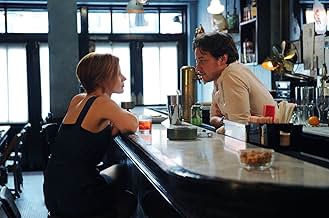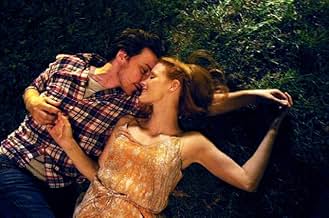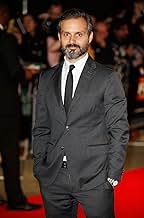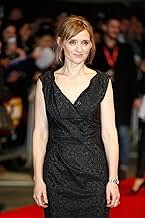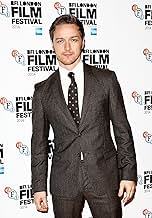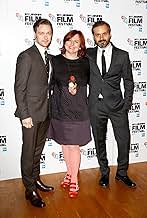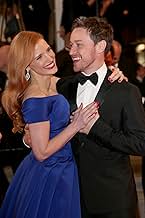One couple's story as they try to reclaim the life and love they once knew and pick up the pieces of a past that may be too far gone.One couple's story as they try to reclaim the life and love they once knew and pick up the pieces of a past that may be too far gone.One couple's story as they try to reclaim the life and love they once knew and pick up the pieces of a past that may be too far gone.
- Awards
- 3 wins & 9 nominations total
Daron Stewart
- Guy Walking on Bridge
- (as Daron P. Stewart)
- Director
- Writer
- All cast & crew
- Production, box office & more at IMDbPro
Featured reviews
Yesterday, I went to see The Disappearance of Eleanor Rigby for a pre-release screening by Louisiana International Film Festival. As the directorial debut for Ned Benson, this movie stars James McAvoy and Jessica Chastain as a young married couple that eventually crumbles. It is a combination of three short films: Him, told from the perspective of James McAvoy's character, Connor, Her, told from the perspective of Jessica Chastain's character, Eleanor, and Them, which features their relationship.
Truth be told, I wanted to like this movie a lot more. Some of the parts were very intriguing, and then some other parts were like watching paint dry. The romantic scenes with both of them together were the most interesting and fascinating. Their chemistry together was great, and their connection was felt and natural. With the two separate perspectives, however, I was drifting in and out. At one point, I even dozed off. Both perspectives were unbalanced, as I felt like there were more parts with Eleanor than there were with Connor. Or at least, I got more out of Eleanor than Connor. From Connor's side, it was a decent tale, but there wasn't a lot of his story coming out, and it wasn't very exciting or interesting, even with the addition of Stuart (Bill Hader). Eleanor's side was a lot more dominant, and it was a mixed bag. It provided more interest, thanks to the subplot with Eleanor and her sister Katy (Jess Weixler). At the same time, some of that was repelling. The actions and behaviors that I got came across as redundant, childish and stand-offish. In other words, the subplot has a yin and a yang.
The approach that Ned Benson took was very original and rare. He built a full-length story out of three short films that all tie in together. It's a very inventive approach, and someday, there's going to be a filmmaker out there that gets it 100% right. Sadly, for The Disappearance of Eleanor Rigby, the narrative structure felt disoriented. As a whole, the movie was lost in translation. The objective was understandable, which was to showcase how they fell in love and where the marriage fell apart, but it was tough to interpret that from beginning to end. Pulp Fiction is one of many examples that pull off a great movie with a non-linear narrative. This movie was nowhere near that level, but it did a good job in its efforts. Also, there were more things that I felt needed to be elaborated on. The story was lacking a lot of things that would've carried out the premise successfully. Instead, it only felt somewhat unfulfilled.
If I can separate those short films and judge them by themselves, they would've been very successful. They are very genuine stories, they had some almost superb acting performances, and their intentions were very smart. In my personal opinion, taking these three short films and merging them to create a 2-hour movie resulted in a jumbled narrative. The objective of the story got lost in the shuffle, the plan went halfway, or maybe too many ways, and in the end, there was some emptiness left inside. Not just for our two lead characters, but also for the viewer that went in with high expectations. Perhaps, they needed to be combined in order to tell the same story, but it would've been better off as a side-by-side collection of short films, or at least it should've been given a better structure. Yet, this was the movie that I ended up getting, which was OK overall, but I expected more. Eh, it happens.
Score: 50/100
Truth be told, I wanted to like this movie a lot more. Some of the parts were very intriguing, and then some other parts were like watching paint dry. The romantic scenes with both of them together were the most interesting and fascinating. Their chemistry together was great, and their connection was felt and natural. With the two separate perspectives, however, I was drifting in and out. At one point, I even dozed off. Both perspectives were unbalanced, as I felt like there were more parts with Eleanor than there were with Connor. Or at least, I got more out of Eleanor than Connor. From Connor's side, it was a decent tale, but there wasn't a lot of his story coming out, and it wasn't very exciting or interesting, even with the addition of Stuart (Bill Hader). Eleanor's side was a lot more dominant, and it was a mixed bag. It provided more interest, thanks to the subplot with Eleanor and her sister Katy (Jess Weixler). At the same time, some of that was repelling. The actions and behaviors that I got came across as redundant, childish and stand-offish. In other words, the subplot has a yin and a yang.
The approach that Ned Benson took was very original and rare. He built a full-length story out of three short films that all tie in together. It's a very inventive approach, and someday, there's going to be a filmmaker out there that gets it 100% right. Sadly, for The Disappearance of Eleanor Rigby, the narrative structure felt disoriented. As a whole, the movie was lost in translation. The objective was understandable, which was to showcase how they fell in love and where the marriage fell apart, but it was tough to interpret that from beginning to end. Pulp Fiction is one of many examples that pull off a great movie with a non-linear narrative. This movie was nowhere near that level, but it did a good job in its efforts. Also, there were more things that I felt needed to be elaborated on. The story was lacking a lot of things that would've carried out the premise successfully. Instead, it only felt somewhat unfulfilled.
If I can separate those short films and judge them by themselves, they would've been very successful. They are very genuine stories, they had some almost superb acting performances, and their intentions were very smart. In my personal opinion, taking these three short films and merging them to create a 2-hour movie resulted in a jumbled narrative. The objective of the story got lost in the shuffle, the plan went halfway, or maybe too many ways, and in the end, there was some emptiness left inside. Not just for our two lead characters, but also for the viewer that went in with high expectations. Perhaps, they needed to be combined in order to tell the same story, but it would've been better off as a side-by-side collection of short films, or at least it should've been given a better structure. Yet, this was the movie that I ended up getting, which was OK overall, but I expected more. Eh, it happens.
Score: 50/100
The first time we see the couple (the first scene), they are so much in love. The scene is filled with fun, excitement, and such passionate love for each other; we are easily drawn into that magical moment of theirs. The next time we see these people, it's like their lives have taken a right about turn. Something terrible has occurred in their life, we don't know what exactly. The movie as well as the characters try their best to keep away from that topic (people who have read about the movie might know what has happened, I don't want to spoil it for others). Although the path has been tread before, Ned Benson has woven an intriguing exploration of a couple after a tragedy, and it's great for a debut feature.
When something terrible happens in our life, the two things we usually tend to do are: trying our best not to remember it. If we do remember, we try to find a close person around on whom we can shift all the blame and direct all our hatred. The best thing we can do is, accept the situation, and let time take over and do its trick.
The topic has been dealt with time and again, in movies as well as novels. With a little more depth, the characters might have been more intriguing. Nonetheless, I was still interested in their lives, and the beautiful one-on-one scenes in the second half were really engaging and emotional. These characters pour their hearts out, either to let it out (and lessen the burden on their mind) or to make the other person feel better. The one which really stands out is the one in which William Hurt (as Eleanor's father) shares an old traumatizing memory with her, involving her; the monologue transports us to the actual place of the event, and we can see the agony in his eyes.
The acting by the two leads, Chastain and McAvoy, is brilliant; it's the emotional backbone of the film. Their eyes have such sorrow; though we know so less about the situation, we are intrigued by what has happened. The sometimes-fun-sometimes-supportive characters played by actors like William Hurt, Isabelle Hupert (it was amazing to see this French talent as Eleanor's mother in this film), Viola Davis, Bill Hader, Jess Weixler and Ciarán Hinds are interesting; their presence makes the story more appealing. I wish the characters were developed a little more; I don't know if the Him-Her version has more depth or not, I'm yet to see it.
The ending might baffle or annoy some, but to me, it was different and delightful. It conveyed the message it intended to, and the background music by Son Lux was just perfect for it.
When something terrible happens in our life, the two things we usually tend to do are: trying our best not to remember it. If we do remember, we try to find a close person around on whom we can shift all the blame and direct all our hatred. The best thing we can do is, accept the situation, and let time take over and do its trick.
The topic has been dealt with time and again, in movies as well as novels. With a little more depth, the characters might have been more intriguing. Nonetheless, I was still interested in their lives, and the beautiful one-on-one scenes in the second half were really engaging and emotional. These characters pour their hearts out, either to let it out (and lessen the burden on their mind) or to make the other person feel better. The one which really stands out is the one in which William Hurt (as Eleanor's father) shares an old traumatizing memory with her, involving her; the monologue transports us to the actual place of the event, and we can see the agony in his eyes.
The acting by the two leads, Chastain and McAvoy, is brilliant; it's the emotional backbone of the film. Their eyes have such sorrow; though we know so less about the situation, we are intrigued by what has happened. The sometimes-fun-sometimes-supportive characters played by actors like William Hurt, Isabelle Hupert (it was amazing to see this French talent as Eleanor's mother in this film), Viola Davis, Bill Hader, Jess Weixler and Ciarán Hinds are interesting; their presence makes the story more appealing. I wish the characters were developed a little more; I don't know if the Him-Her version has more depth or not, I'm yet to see it.
The ending might baffle or annoy some, but to me, it was different and delightful. It conveyed the message it intended to, and the background music by Son Lux was just perfect for it.
The Disappearance of Eleanor Rigby was originally intended as a movie to be focused on a man's perspective as his wife disappeared out of his life. When writer-director Ned Benson brought star Jessica Chastain on, she asked him about Eleanor's perspective and he was so enraptured with this question that he wrote an entire version of the movie dedicated to her view point of the marriage. The two films were shot simultaneously, but times and audiences being what they are, the distributor cut a third version of the film so that audiences could experience the whole thing in one go.
As someone who has seen all three versions of the films (his, her and them) I can tell you this is a mistake. The best way to experience the film is by watching some combination of the Him & Her versions (pick your poison, watching either one first has its benefits and drawbacks, although "Him" does start earlier in the timeline than "Her").
The problem with Them is that it reveals that Rigby is actually a very simplistic movie. It's the story of married couple Connor Ludlow (James McAvoy) and Eleanor Rigby (Jessica Chastain) whose marriage has suffered a devastating blow. Rigby tries to kill herself and when she is unsuccessful she leaves her husband and the two begin separate journeys of discovery. The joy in the Him & Her versions is seeing the different ways the two people experience the same event. Rigby and Ludlow both disappear from each other's narratives for long periods of time posing questions about certain events, questions that get answered when you watch whichever of the two movies you choose to watch first. There's also a handful of scenes that are the same in both stories but the tone and information conveyed is different, showing how people can interpret things differently. All the joy of this is wiped out of the Them version in which everything plays chronologically and we don't get multiple versions of the same scenes.
It's an okay movie, but it will leave you wondering what the fuss is all about.
As someone who has seen all three versions of the films (his, her and them) I can tell you this is a mistake. The best way to experience the film is by watching some combination of the Him & Her versions (pick your poison, watching either one first has its benefits and drawbacks, although "Him" does start earlier in the timeline than "Her").
The problem with Them is that it reveals that Rigby is actually a very simplistic movie. It's the story of married couple Connor Ludlow (James McAvoy) and Eleanor Rigby (Jessica Chastain) whose marriage has suffered a devastating blow. Rigby tries to kill herself and when she is unsuccessful she leaves her husband and the two begin separate journeys of discovery. The joy in the Him & Her versions is seeing the different ways the two people experience the same event. Rigby and Ludlow both disappear from each other's narratives for long periods of time posing questions about certain events, questions that get answered when you watch whichever of the two movies you choose to watch first. There's also a handful of scenes that are the same in both stories but the tone and information conveyed is different, showing how people can interpret things differently. All the joy of this is wiped out of the Them version in which everything plays chronologically and we don't get multiple versions of the same scenes.
It's an okay movie, but it will leave you wondering what the fuss is all about.
Apparently different versions exist. This IMDb site lists the running time as a little over two hours, but the version I saw was listed at well over three hours. It was very long, basically two movies back to back. Many of the scenes were shown twice, from the perspective of the two principals, with differences that were sometimes striking and sometimes very subtle. I found it fascinating, but I can imagine that some viewers will become impatient. (My bladder did -- don't go into this one with a large Coke.) I would like to see it again on video so I can go back and forth and compare versions of events, but I am worried that I'll end up renting a shorter version. The existence of different versions makes it a moving target -- it's difficult to review, and even more difficult for a prospective viewer to evaluate on the basis of published reviews, if you don't know which version the reviewer saw. They say the difference between a good haircut and a bad haircut is three days. Well, the difference between a good movie and a bad movie may be as little as three minutes, edited out or left in.
I'm giving this movie 9 stars because of a single line of dialog that blew me away and changed my perception of a lot of experiences in my own life. You can't ask for more than that from a movie. It's a comment made by one of the minor characters (the waitress) -- almost a throwaway line, really -- about the effect that people have on each other in relationships. I don't even know if it is included in the shorter version of the movie.
I'm giving this movie 9 stars because of a single line of dialog that blew me away and changed my perception of a lot of experiences in my own life. You can't ask for more than that from a movie. It's a comment made by one of the minor characters (the waitress) -- almost a throwaway line, really -- about the effect that people have on each other in relationships. I don't even know if it is included in the shorter version of the movie.
"All I want is a chance to just talk it out. After that you can disappear to wherever it is you disappear to."
To be honest I had no idea what this film was about before going into it. All I knew is that it starred Jessica Chastain and James McAvoy, two of the most talented actors I've seen in the past few years. The title had me fooled because I was expecting this sort of suspenseful thriller similar to Gone Girl. During the first scenes I was lamenting that Chastain would probably only be in a few scenes since she would eventually disappear, but what a fool I was. This was actually a romantic drama (or should I say anti-romantic drama?) with two strong lead performances centering on a couple who have experimented a tragedy in their lives and aren't capable of coping with it together. They've become distant and love seems to be only a far away memory. In a sense it has a similar style as Blue Valentine where you get flashbacks of the couple when they were in love contrasting with their present situation. While watching this film I had no idea that director Ned Benson had actually made two movies about The Disappearance of Eleanor Rigby from the view point of each of the characters (His and Hers). The version I was watching was a compilation of both those films, summarized in two hours going back and forth from both their view points. It was no wonder I felt like something was missing in this story. If you were to watch both original versions of Benson's film the running time would be over three hours long, but in Them the film is cut into a two hour film. I never felt like I got a sense of who these characters were in this version and I wonder how much it had to do with the fact that so much was cut out of the film. After experiencing Benson's two hour joint film I have no intentions of watching the separate films because I was incredibly disappointed with how vague and void this character study felt. By the end of the film I couldn't relate to either character and felt like they did around their parents when they had no clue what they were talking about (they both use this same line towards their parents in at least a couple of occasions).
Despite the slow pace of the film (the two hours actually felt like three) I was still hooked with the story expecting it to head somewhere. Jessica Chastain and James McAvoy are such great actors that they held my interest in the film and they were a pleasure to watch. The story unfolds in such a way that you don't get much of a sense as to what is happening. As we get some flashbacks we begin to understand what triggered the couple to grow apart from one another, but some things are missing. There are also very strange relationships that Chastain's character has with her parents (Isabelle Huppert and William Hurt). She also shares a few scenes with a Professor she begins to take classes with played by Viola Davis, but those scenes also felt disconnected from the entire film. The same thing happened with McCoy's character and the odd relationship he has with his father (Ciaran Hinds). He owns a restaurant/bar and works with his close friend played by Bill Hader with whom he also shares some strange and misplaced scenes together. Perhaps it was the way that both films were joined together, but I felt like something important was left out and I wasn't able to engage with the characters despite enjoying the performances. Chastain is fantastic and continues to get better over time. She has had stellar roles this year in Interstellar, A Most Violent Year, and now this. Perhaps her breakout role came in 2011 with Take Shelter and The Tree of Life, but she had already collaborated with Ned Benson a year before for one of his short films, The Westerners. If you are a fan of Chastain's work I'd recommend this film, but otherwise I'd suggest you to watch the two separate films because Them felt incoherent and incomplete at times.
To be honest I had no idea what this film was about before going into it. All I knew is that it starred Jessica Chastain and James McAvoy, two of the most talented actors I've seen in the past few years. The title had me fooled because I was expecting this sort of suspenseful thriller similar to Gone Girl. During the first scenes I was lamenting that Chastain would probably only be in a few scenes since she would eventually disappear, but what a fool I was. This was actually a romantic drama (or should I say anti-romantic drama?) with two strong lead performances centering on a couple who have experimented a tragedy in their lives and aren't capable of coping with it together. They've become distant and love seems to be only a far away memory. In a sense it has a similar style as Blue Valentine where you get flashbacks of the couple when they were in love contrasting with their present situation. While watching this film I had no idea that director Ned Benson had actually made two movies about The Disappearance of Eleanor Rigby from the view point of each of the characters (His and Hers). The version I was watching was a compilation of both those films, summarized in two hours going back and forth from both their view points. It was no wonder I felt like something was missing in this story. If you were to watch both original versions of Benson's film the running time would be over three hours long, but in Them the film is cut into a two hour film. I never felt like I got a sense of who these characters were in this version and I wonder how much it had to do with the fact that so much was cut out of the film. After experiencing Benson's two hour joint film I have no intentions of watching the separate films because I was incredibly disappointed with how vague and void this character study felt. By the end of the film I couldn't relate to either character and felt like they did around their parents when they had no clue what they were talking about (they both use this same line towards their parents in at least a couple of occasions).
Despite the slow pace of the film (the two hours actually felt like three) I was still hooked with the story expecting it to head somewhere. Jessica Chastain and James McAvoy are such great actors that they held my interest in the film and they were a pleasure to watch. The story unfolds in such a way that you don't get much of a sense as to what is happening. As we get some flashbacks we begin to understand what triggered the couple to grow apart from one another, but some things are missing. There are also very strange relationships that Chastain's character has with her parents (Isabelle Huppert and William Hurt). She also shares a few scenes with a Professor she begins to take classes with played by Viola Davis, but those scenes also felt disconnected from the entire film. The same thing happened with McCoy's character and the odd relationship he has with his father (Ciaran Hinds). He owns a restaurant/bar and works with his close friend played by Bill Hader with whom he also shares some strange and misplaced scenes together. Perhaps it was the way that both films were joined together, but I felt like something important was left out and I wasn't able to engage with the characters despite enjoying the performances. Chastain is fantastic and continues to get better over time. She has had stellar roles this year in Interstellar, A Most Violent Year, and now this. Perhaps her breakout role came in 2011 with Take Shelter and The Tree of Life, but she had already collaborated with Ned Benson a year before for one of his short films, The Westerners. If you are a fan of Chastain's work I'd recommend this film, but otherwise I'd suggest you to watch the two separate films because Them felt incoherent and incomplete at times.
Did you know
- TriviaThe project was shot as a two-part movie following the story of a couple played by James McAvoy and Jessica Chastain from both of their points of view. The two films premiered in 2013 at the Toronto Film Festival. After the premiere, although it received rave reviews, Ned Benson started cutting the movie again, as one feature, which premiered at the Cannes Film Festival. All three movies received a theatrical release.
- Quotes
Julian Rigby: Tragedy is a foreign country. We don't know how to talk to the natives.
- Alternate versionsThis film, along with "The Disappearance of Eleanor Rigby: Her" and "The Disappearance of Eleanor Rigby--Him" (both dated 2013) are variations of the same film. Runtimes are different, as well as editing, which puts the emphasis on the protagonists' different points of view.
- ConnectionsEdited from The Disappearance of Eleanor Rigby: Him (2013)
- SoundtracksSo In Love
Written by Orchestral Manoeuvres in the Dark
Performed by Orchestral Manoeuvres in the Dark
- How long is The Disappearance of Eleanor Rigby: Them?Powered by Alexa
Details
Box office
- Budget
- $3,000,000 (estimated)
- Gross US & Canada
- $587,774
- Opening weekend US & Canada
- $66,941
- Sep 14, 2014
- Gross worldwide
- $1,448,076
- Runtime
- 2h 3m(123 min)
- Color
- Sound mix
- Aspect ratio
- 2.35 : 1
Contribute to this page
Suggest an edit or add missing content




